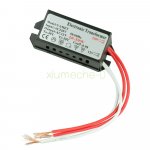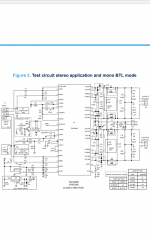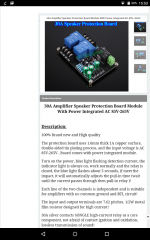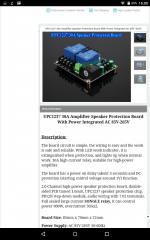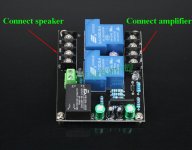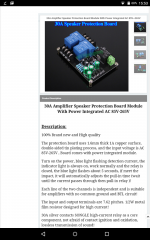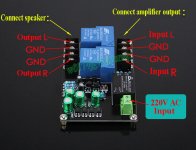My PSU is that on the picture.
If i understand i cannot use this speaker protection module with DC voltage?
Ok, this is SMPS, no transformer here to tap another rectifier.
I think the easiest and cheapest way to solve this problem, is to use
small PSU like this (or similar)
Amazon.com: LGM 18.0VDC AC/DC Adapter Replacement for FranMar FRA018-S18-4 31221 Mackie Mix5 Mix12FX Mix 12 FX Mixer DC18V 1000mA 18VDC 18.0V 1.0A Switching Power Supply Cord Cable Charger PSU: Electronics
You can open it up, and place the psu in the enclosure of your mp. It's small -just like your buck converter, but fed from the mains instead of the SMPS.
GND output of this small PSU can be connected to the GND of the amp, and the GND of the protection board.
Last edited:
You also need to find out if your amp is bridged or not.
It looks like TDA7498E can work in both ways, it depends on the implementation.
If it's bridged (BTL mode), you can't use this speaker protection board for it, as is.
see this board for BTL amps:
Amazon.com: Digital Amplifier Speaker Protection Board BTL Steady Module for TDA7492 TDA7498 TPA3116: Industrial & Scientific
It looks like TDA7498E can work in both ways, it depends on the implementation.
If it's bridged (BTL mode), you can't use this speaker protection board for it, as is.
see this board for BTL amps:
Amazon.com: Digital Amplifier Speaker Protection Board BTL Steady Module for TDA7492 TDA7498 TPA3116: Industrial & Scientific
I don't think it will work with buck converter.
These converters usually ISOLATE input from output, so GND output from the converter is not the same GND as of the amp (or GND input of the converter).
You can't join them at the protection board.
One option would be to use separate rectifier connected directly to the transformer (assuming your PSU has a transformer), and feed buck converter from that rectifier, and then connect output of the buck converter to PLUS and GND of the protection board.
Or, you can find NON ISOLATING buck converter (common ground for input and output of the converter).
Or, instead using buck converter, use small regulator (e.g. Zener + transistor + heatsink) - but it will waste a lot of energy (heat) to drop 20V at at least 200mA...
Or, just a last thought, maybe out GND of the buck converter CAN be connected to input GND?
Can i use this type of transformer to plug AC 220v from my home and it will convert to AC 12v for i can plug into the speaker protection module?
Can you give me a help?
Attachments
Last edited:
Can i use this type of transformer to plug AC 220v from my home and it will convert to AC 12v for i can plug into the speaker protection module?
Can you give me a help?
Yeah, if you can find wall-pluggable 12V AC rtansformer, why not?
The one on your photo looks ok.
AC to AC Wall Adapter Transformer 12 Volt @ 1500mA Black Straight 2.1mm Female Plug: Electronic Power Transformers: Amazon.com: Industrial & Scientific
But if your amp is bridged (BTL mode), you still can't use this protection board for both channels.
I see now why the seller wrote that 2 boards are needed...
If your amp is bridged, speakers do not share GND, and you need two independent protection boards, powered from two independent AC PSUs (12V ac transformers). Kind of overkill...
Yeah, if you can find wall-pluggable 12V AC rtansformer, why not?
The one on your photo looks ok.
AC to AC Wall Adapter Transformer 12 Volt @ 1500mA Black Straight 2.1mm Female Plug: Electronic Power Transformers: Amazon.com: Industrial & Scientific
But if your amp is bridged (BTL mode), you still can't use this protection board for both channels.
I see now why the seller wrote that 2 boards are needed...
If your amp is bridged, speakers do not share GND, and you need two independent protection boards, powered from two independent AC PSUs (12V ac transformers). Kind of overkill...
My amplifier is stereo and i not bridged the two channels to mono, can i use this speaker protection with my amp TDA7498E?
My amplifier is stereo and i not bridged the two channels to mono, can i use this speaker protection with my amp TDA7498E?
Check if (-) outputs of each channel are connected to each other, and perhaps to the GND?
Do you have schematic of your amp?
I don't know too much TDA7498E, but from the datasheet, it looks like the speaker outputs are NOT connected to GND (at least not directly)...
It looks like it might be internally bridged - each chip has 4 amps (channels) in it...
Last edited:
I personally can not recommend the use of these boards.
The one ordered failed after about a dozen on/off cycles.
One trace on the underside failed around a constriction, started arcing and put out smoke.
I am not at home so I cannot post photos but there is a photo here. https://www.diyaudio.com/forums/con...ntaneous-electrical-failures.html#post6233103
It could be that I am unlucky but buyer beware.
The one ordered failed after about a dozen on/off cycles.
One trace on the underside failed around a constriction, started arcing and put out smoke.
I am not at home so I cannot post photos but there is a photo here. https://www.diyaudio.com/forums/con...ntaneous-electrical-failures.html#post6233103
It could be that I am unlucky but buyer beware.
Last edited:
I personally can not recommend the use of these boards.
The one ordered failed after about a dozen on/off cycles.
One trace on the underside failed around a constriction, started arcing and put out smoke.
I am not at home so I cannot post photos but there is a photo here. https://www.diyaudio.com/forums/con...ntaneous-electrical-failures.html#post6233103
It could be that I am unlucky but buyer beware.
I used few of them, last time 5 years ago. No problems.
These days I use exclusively SSRs instead of electro-mechanical relays, especially fake ones 🙂
Check if (-) outputs of each channel are connected to each other, and perhaps to the GND?
Do you have schematic of your amp?
I don't know too much TDA7498E, but from the datasheet, it looks like the speaker outputs are NOT connected to GND (at least not directly)...
It looks like it might be internally bridged - each chip has 4 amps (channels) in it...
TDA7498E it's only one chip my dear minek.
Is this the schematic of this amp?
Attachments
TDA7498E it's only one chip my dear minek.
Is this the schematic of this amp?
The chip itself contains 4 amps in it (4 channels).
As you see in the schematic, speakers are NOT connected to the ground. Each of both channel uses 2 internal amps from the chip, internally bridged.
Your protection board assumes that speakers for both channels
SHARE the same ground.
For this reason, you need TWO protection boards, that do not share ground, and TWO PSUs.
At this point, it would be much simpler and cheaper to use different protection board, designed specifically for bridged amplifiers:
https://www.amazon.com/Digital-Amplifier-Speaker-Protection-TDA7492/dp/B07KNL6386
The chip itself contains 4 amps in it (4 channels).
As you see in the schematic, speakers are NOT connected to the ground. Each of both channel uses 2 internal amps from the chip, internally bridged.
Your protection board assumes that speakers for both channels
SHARE the same ground.
For this reason, you need TWO protection boards, that do not share ground, and TWO PSUs.
At this point, it would be much simpler and cheaper to use different protection board, designed specifically for bridged amplifiers:
Amazon.com: Digital Amplifier Speaker Protection Board BTL Steady Module for TDA7492 TDA7498 TPA3116: Industrial & Scientific
Hi my dear minek, i hope you have a nice day.
Can i use anyone of this speaker protection module in the picture bellow?
Best regards and good health for you.
Attachments
Hi my dear minek, i hope you have a nice day.
Can i use anyone of this speaker protection module in the picture bellow?
Best regards and good health for you.
No, they all share the GND for both channels speakers.
You need to find board similar to the one I posted earlier.
Description should include keywords 'BTL', 'bridge', 'isolation'.
Your amp is BRIDGED (internally).
You SHOULD be able to buy an additional protection board (same one) and use one board for each channel? That would keep the speaker grounds separate. Other option is to find a mono-speaker board and buy two of them, one for each speaker.
Google it, but I believe that is an (easy) way to "get around" the common ground on this dual speaker board.
Google it, but I believe that is an (easy) way to "get around" the common ground on this dual speaker board.
You SHOULD be able to buy an additional protection board (same one) and use one board for each channel? That would keep the speaker grounds separate. Other option is to find a mono-speaker board and buy two of them, one for each speaker.
Google it, but I believe that is an (easy) way to "get around" the common ground on this dual speaker board.
Yes, I mentioned it yesterday - one more board of the same type, BUT he also needs one more PSU for it 🙁
The ground can not be shared between these 2 boards.
So all in all, it's cheaper and better to buy new board suited for this amp.
No, they all share the GND for both channels speakers.
You need to find board similar to the one I posted earlier.
Description should include keywords 'BTL', 'bridge', 'isolation'.
Your amp is BRIDGED (internally).
The first and second picture of the speaker protection say on description "Each line of the two channels is independent and is suitable for amplifiers with no common ground and BTL circuit!"
Correct me if i'm wrong, but if i understand, this speaker protection module is suitable for BTL and i can use in my amplifier board TDA7498E, right minek?
Attachments
The first and second picture of the speaker protection say on description "Each line of the two channels is independent and is suitable for amplifiers with no common ground and BTL circuit!"
I was looking at the picture, and I saw speakers connectors marked as GND, but the statement above clarifies this.
If the above statement is true, then yes, it should be suitable for your amp. It even has its own PSU; not bad.
I was looking at the picture, and I saw speakers connectors marked as GND, but the statement above clarifies this.
If the above statement is true, then yes, it should be suitable for your amp. It even has its own PSU; not bad.
I hope the description from the seller os right, otherwise, if i buy this module and this doesn't work as he say, i will return the item to him.
Meanwhile, it's possible plug into it AC 220v directly from my home (N & L), right?
Yes, it looks like this.I hope the description from the seller os right, otherwise, if i buy this module and this doesn't work as he say, i will return the item to him.
Meanwhile, it's possible plug into it AC 220v directly from my home (N & L), right?
Yes, it looks like this.
I am tempted to buy this module. What do you think my dear minek?
Other question, yesterday you say you use SSR, what is this?
Sorry for this question my dear.
SSR = solid state realy
These boards use Mosfets instead of mechanical relays to
connect/disconnect speakers.
Haven't seen any on Ebay yet....
Many threads on that subject here on DIY.
E.g this one:
SSR for speaker protection?
These boards use Mosfets instead of mechanical relays to
connect/disconnect speakers.
Haven't seen any on Ebay yet....
Many threads on that subject here on DIY.
E.g this one:
SSR for speaker protection?
- Home
- Amplifiers
- Solid State
- UPC1237 Speaker protection board: Current requirements
